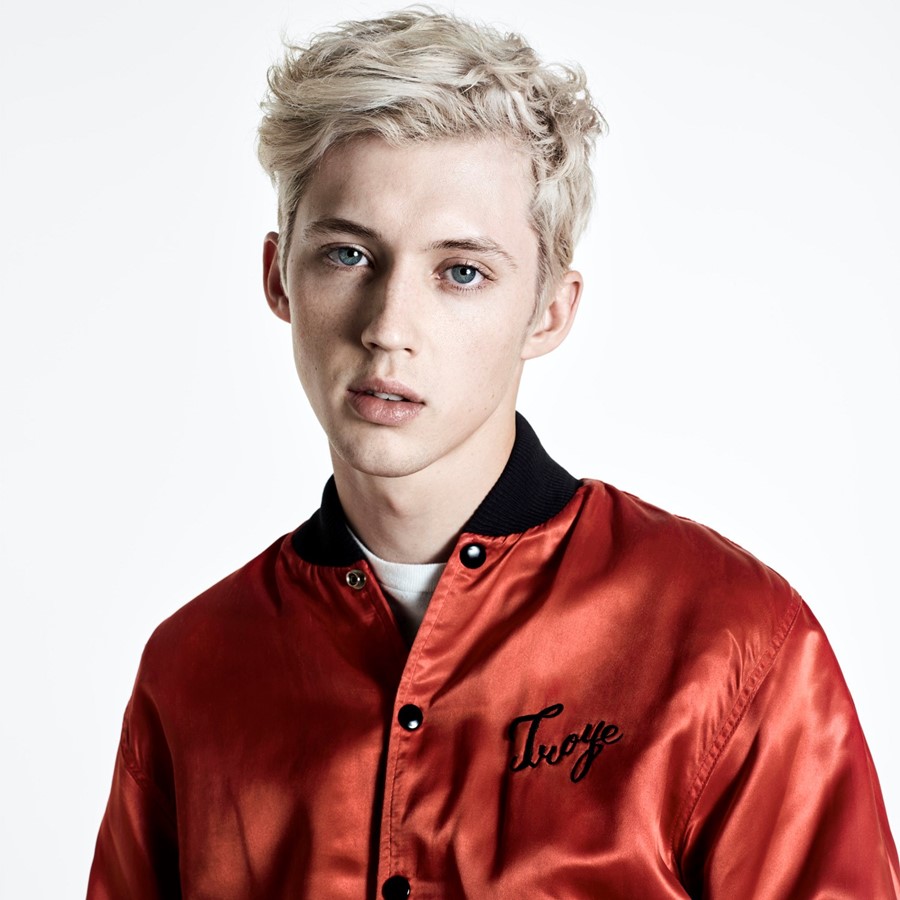Troye Sivan on Coming out and Why He Doesn’t Want to Be a Gay Icon
Having just announced his new album, Bloom, the online-sensation-turned-pop-prince takes a break from his busy schedule to talk to Another Man
Troye Sivan would like to politely decline the role of gay icon. Sure, his vignettes of the uncontainable joy and pain of queer youth – expressed through springy beats, convulsive synths, and slippery, writhing dance moves – might be as exhilarating as they are important, but it’s a little more pressure than his 22-year-old shoulders can handle. Besides, he doesn’t think any single person should represent an entire community. “I’m one voice of so many that are missing,” he says quietly. “There are plenty of other people who need to be heard first.”
Sivan and I are sitting in the back room of a recording studio in Notting Hill. The Australian musician is settled on a sofa, his wiry frame swamped by a pristine grey coat, under which is a mesh, leather-necked patchwork top. Outside the door, a few dozen hand-picked fans are buzzing past, towards a room where they’ll hear a preview of his forthcoming album, Bloom, well before its release on 31st August. To these fans, Sivan has been an icon since before he broke into the world of pop music.
Scroll ten years deep into Sivan’s YouTube channel, and you’ll find low-res footage of a sprightly pre-teen, Kippah resting on his floppy hair, singing Jason Mraz’s I’m Yours. Skip a few years ahead, after Sivan landed the role of a young Wolverine in X-Men Origins, and you’ll see that same boy reintroducing himself as a blogger – with whimsical posts like ‘Australian Boy Does Accents’, and ‘Annoying Things People Do On Instagram’ – and the view count creep up into the millions.
Sivan held onto those fans when he launched his music career in 2013, signing a record deal while simultaneously revealing a truth about himself he’d avoided saying until now. “I’m Troye Sivan,” he began in a 2013 video entitled ‘Coming Out’, “and this is probably the most nervous I’ve been in my entire life.” He didn’t ask his new label’s permission to reveal that he was gay – and why should he? – but he was relieved to get a message of congratulations from them a few days later.
These days, Sivan’s not so nervous. With his first album, Blue Neighbourhood, he sang of coming out and leaving home – with his second, he revels in what comes after that. The album’s lead single My My My! is playfully intimate, his performances of it flamboyant and flirty. “Spark up, buzz cut,” he sings, painting a picture with four words, “You got my tongue between your teeth.” Bloom, meanwhile, is – in Sivan’s own words – a “bop ‘bout bottoming.” In embodying “a carefree gay boy strutting around however he wants,” Sivan is providing the sort of example he wished he could have seen at 14, when he decided his sexuality was something he’d take to his grave.
AM: Your new single, My My My!, and your performance of it on SNL, felt like a real unapologetic celebration of same-sex eroticism. Was that important to you?
TS: Yeah I think so. I was conscious of not making the video explicitly erotic, whilst still communicating something that hasn’t really been communicated enough. I was thinking to myself, ‘What do I want to see that’s not being represented in the media? What is everyone – me included because I’ve been holding off from doing this for so long – so scared of? What is so scary about a young gay guy really just enjoying himself, and letting him move as feminine or as masculine as he wants, and strutting around?’ I did want to explore that carefree confidence, because I definitely didn’t see a lot of it growing up, where I felt like, ‘Oh wow that’s what it looks like to be gay and happy’.
AM: You’ve said you weren’t a huge fan of classic romance growing up. I wonder whether that’s because you didn't see yourself reflected in those stories?
TS: Maybe yeah. Because of the lack of representation, there’s such limited stories that have been told. There’s so much to cover – it’s a hugely complex, nuanced, massive group of people, and there’s so many stories to tell. [With my first album] it was coming of age and coming out and first love, and this time I’m in a different place, and I want to tell my story of where I’m at now. With people like Hayley Kiyoko and Brockhampton, we’re starting to get, finally, a diverse group of different LGBTQ perspectives. That’s why I politely don’t want to take on that ‘gay icon’ thing. I’m one voice of so many that are missing, and so I’m just trying to tell my story, and right now I’m having so much fun in my life, I feel confident, I’m just enjoying myself, and so that was really important to me to express.
“We’re starting to get, finally, a diverse group of different LGBTQ perspectives. That’s why I politely don’t want to take on that ‘gay icon’ thing” – Troye Sivan
AM: We’re at a point where there are many more LGBTQ voices in the media, but if you’re queer, you’re still often expected to represent an entire community.
TS: And I don’t. I just don’t represent everybody, because I’m extraordinarily lucky. I come from a middle-class white family in Australia, and all of my dreams have come true by 22. I had the easiest coming out in the world... I don’t ever want to take that on really, because there are plenty of other people who need to be heard first.
AM: You say that you had an easy coming out, but you fought with yourself about it for a while didn’t you?
TS: There was definitely that internal struggle. Years of pushing thoughts out of my head, and having my heart sink whenever I would think about it, and censoring the way that I moved, and the way that I spoke, and the things that I watched on TV, and the music that I listened to, and the company that I kept, and the way that I dressed… I was really scared, you know? Coming out to myself was probably the biggest struggle of all, and then from that point onwards it was pretty smooth sailing, because I knew with certainty that my family was gonna be OK with it. But even so, you’ve got to do the thinking of like, ‘If my parents were to not accept me, what would I do? Where would I go?’ And when you’re 14, that’s rough. That’s rough for anyone.

AM: It’s a lot of pressure to put on yourself.
TS: Yeah. I just remember I got to the point where the internal monologue was driving me actually crazy. I felt like I was going insane, because I had reached the point where I was so petrified of lying and keeping this secret, but the fear of coming out was equally as scary. It was this constant conversation in my head: ‘Should I tell my dad now? Should I tell my mum tomorrow? What if this happens? What if that happens?’ And I’d lock my door and watch coming out videos. It was just so much, and then I only really got relief from it once I was on the other side of it all. So yeah, it is a stressful experience for anyone, but I definitely got lucky.
AM: How long was there between accepting it yourself and vocalising it to someone?
TS: The first time I ever came out to anyone was to my best friend, and I really, really wasn’t expecting it. I had hardly let myself think about that. I had thought about it in the back of my head, but thought that I was honestly gonna take it to my grave. We were having a conversation one day about deep dark secrets, and after an hour or more of her kind of coaxing I told her, ‘I cannot believe I’m about to say this, but I think I might be bisexual’. That took me by surprise completely, and after that we didn’t speak about it again for a really long time. That was when I started having those moments where you look at yourself in the mirror and you’re like, ‘Oh holy shit, this is my reality. This is my life, and this is happening to me.’ And then you start the self-acceptance phase. Well for me, that was when I started it. And between that point and me coming out again was probably eight months or something like that.
“Coming out to myself was probably the biggest struggle of all, and then from that point onwards it was pretty smooth sailing” – Troye Sivan
AM: You get a lot of fans asking for your advice about coming out, which must be gratifying, but tricky.
TS: Yeah totally. And the other thing is, you don’t have to come out. I think there's a lot of pressure put on it, and I definitely highly recommend it if it’s safe and if you feel comfortable and confident in that decision. For me personally, it’s been a great source of relief and happiness, but you’ve got to know when is right for you and your circumstances. That is what’s tough about giving any sort of advice; everyone’s circumstances are different, and everybody’s different.
AM: There are moments in your songs where you’re almost reveling in the pain of heartbreak – lines like ‘Never knew loving could hurt so good’. Would you agree?
TS: I don’t know, maybe that’s the songwriter in me just being like, ‘This really hurts, but I always know that I’ve got songwriting to fall back on as like a coping mechanism’, so maybe that’s the pain coming out in the songwriting. It’s a bit of a safety blanket for me, that’s my one space where I can really let it all out and say whatever. Before this album, I’d written maybe one happy song, because music for me has always been a place that I go to when I don’t really know what else to do. Only this time have I felt like I want to express joy through music.
Troye Sivan’s new album, Bloom, is out August 31, 2018 on Polydor Records












